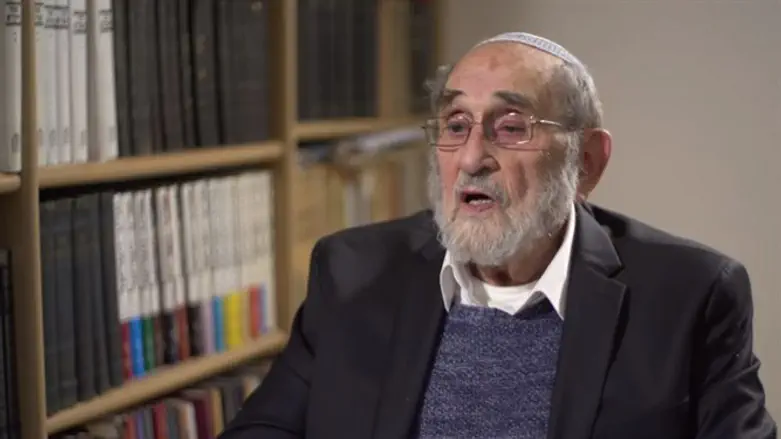
Rabbi Issachar Dov Goldstein was born in 1929 in Bratislava, Slovakia, the third of five brothers and sisters. His father Moshe Shraga was the rabbi of the community.
Even before the German occupation in the summer of 1944, the family was persecuted by the anti-Semitic Slovak government, and after the occupation, they were saved from several aktions. Dov was a junior activist in the "Working Group" of Gisi Fleischmann, Chaim Michael Dov Weissmandl and their associates, and was thus exposed to information about the fate of the Jews in Poland. Dov and his friends built a wall in the attic of the family house and prepared a hiding place there.
In the fall of 1944, his mother gave birth to a baby, Eliezer. In the aktions carried out by the Germans during this period, the mother, Chaya Feiga, the baby Eliezer and Dov's sister, 12-year-old Buna, were caught. They were deported to Auschwitz and murdered there. Dov and his father hid in a hiding place prepared by Dov, but the Germans discovered them. They were taken to the Sered concentration camp, and a week later they were deported to Auschwitz. Upon their arrival in the camp, his father was murdered in the gas chambers, while Dov was transferred to a factory in a subcamp of Buchenwald.
Throughout this period, Dov was as strict as he could be in observing the mitzvot (commandments). On Hunukkah, the prisoners obtained oil in a can. They prepared a massive thread of garment and lit it as a Hanukkah lamp. The burnt oil had a strong smell, and the German commander came to check the source of the smell. But then the bombing began, the commander left and Dov and his friends were saved. On Passover 1945, a Jewish prisoner obtained a little flour and brought it to the hut. The flour was enough to bake one matzah on a can on which the prisoners had set a fire, and on each seder evening every prisoner in the hut received a crumb of flour.
As the American front approached, Dov and his comrades marched on a death march and reached Buchenwald. Two days after their arrival, the camp was liberated by the American army. Dov contracted typhoid fever and was hospitalized in an American hospital that opened in the camp. After he recovered he returned to Bratislava, and upon his return discovered that all the contents of his house had been robbed, except for the holy books.
Dov joined the Bericha and Haapala movement and thus reached Italy with a group of Bnei Akiva. In August 1946 he boarded the immigration ship "Four Freedoms", which was soon seized by the British. Dov was imprisoned for seven months in a detention camp in Cyprus, and upon his arrival in Israel he was imprisoned for a month in the Atlit detention camp. Afterward, he joined the Bnei Akiva yeshiva in Kfar Haroeh and settled in Biriya as part of the sixth seed group of Bnei Akiva, where he fought in the War of Independence and was one of the founders of Kibbutz Ein Tzurim.
Dov founded Bnei Akiva yeshiva in Be'er Sheva, and for many years was a teacher of Talmud and Bible and a tour guide for students and tourists throughout the country. In the 90s he served as a community rabbi and shochet (butcher) in Kosice, Slovakia. Dov also accompanies student delegations to Poland, telling youth about his experiences during the Holocaust.
Dov and his wife Shulamit have three children, seven grandchildren and four great-grandchildren.
